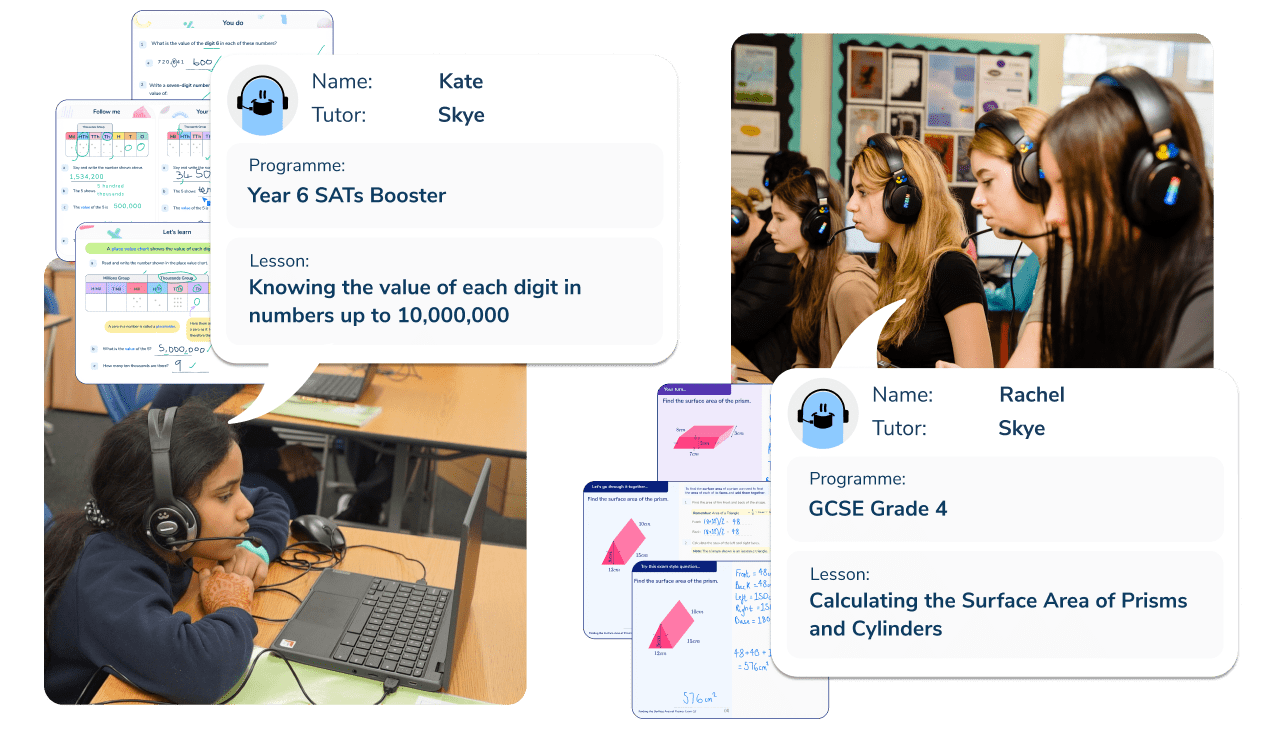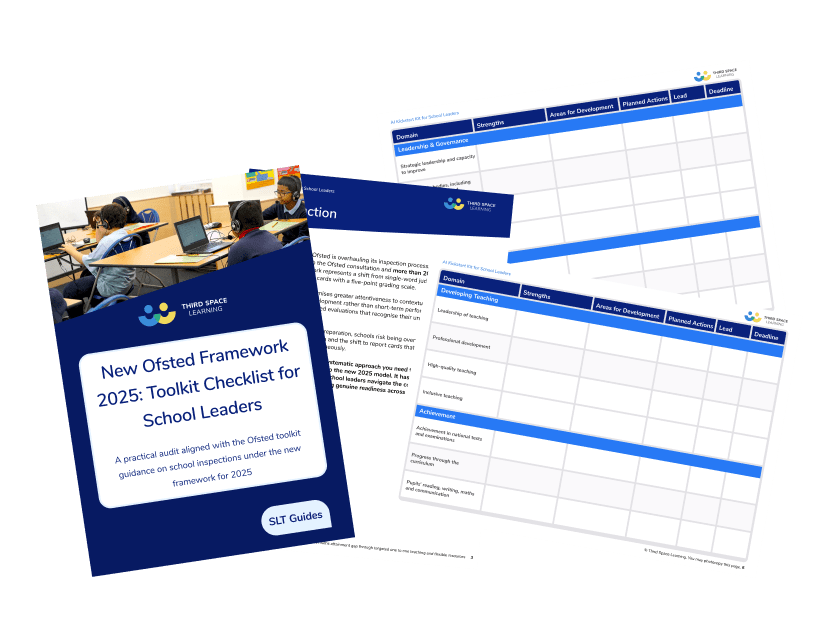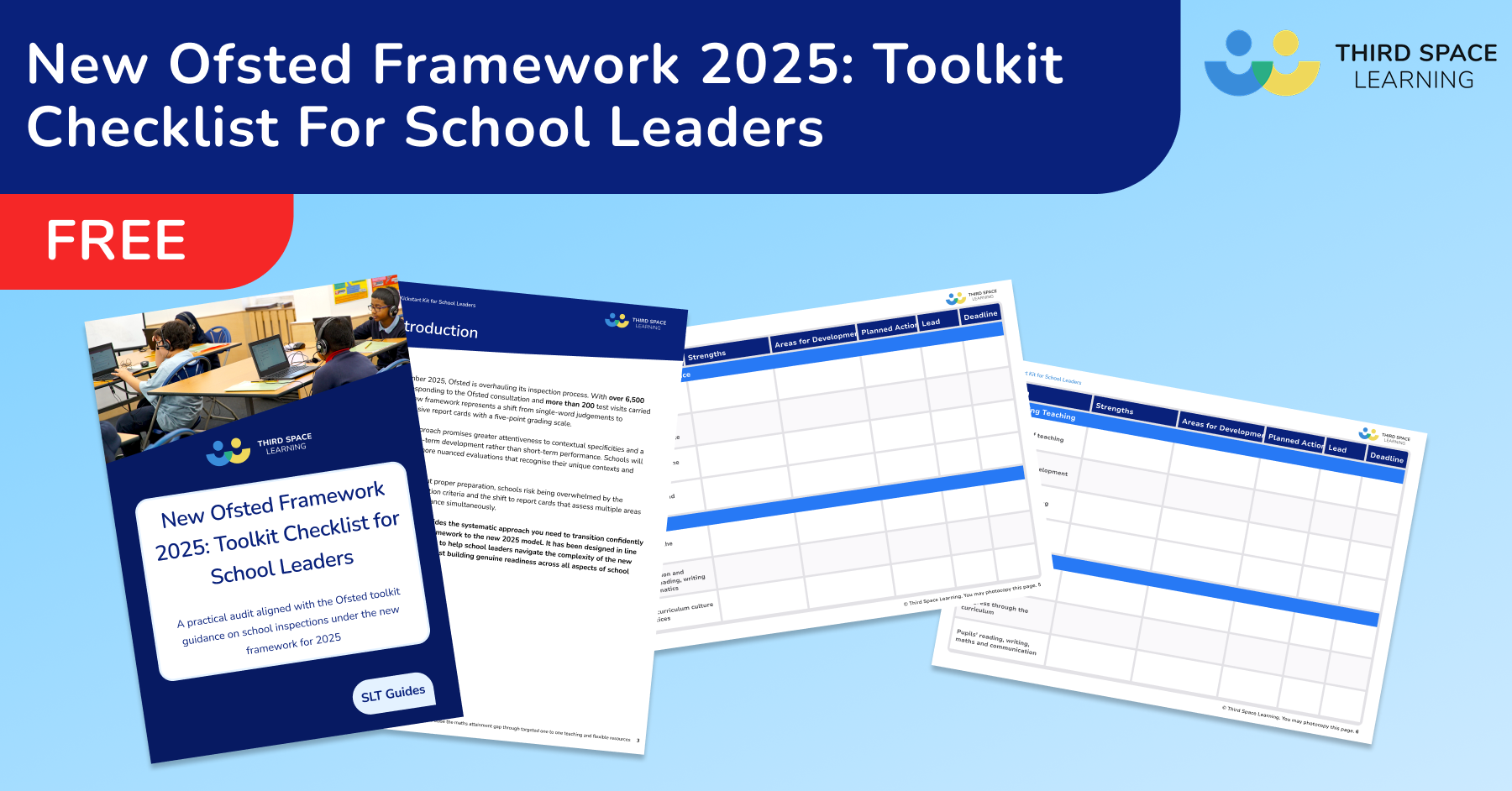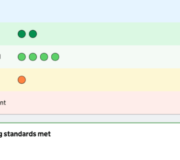The 13 Most Common Ofsted Questions And Answers
Ofsted questions (and answers) can be a nerve-wracking element of Ofsted’s school inspections. However, with proper preparation, it doesn’t need to be. This article aims to help prepare headteachers and senior leaders for a smooth Ofsted visit.
Having recently welcomed Ofsted into her classroom, our author Zoe Hardman brings her expertise and experience to guide you through what to expect if you receive ‘the call’. Although this is not an exhaustive list of expected questions, this is a useful starting point for preparation. And, as most teachers and schools know very well, preparation is key to a stress-free Ofsted visit!
Ofsted new education inspection framework
This article is written as per the school inspection handbook that came into force in 2019 and was most recently updated on 16th September 2024.
At the end of 2025, Ofsted started rolling out the new framework under which educational settings will be inspected. The curriculum remains important, but instead of one word judgements schools and other establishments now receive Ofsted report cards with a different grading system.
Inspectors no longer suggest a subject for a ‘deep dive’ but work more collaboratively with headteachers to agree lines of enquiry. Many of the questions asked in a deep dive are still relevant in the new framework.
You can read more about the new Ofsted framework 2025 here. We are continuing to update all our Ofsted guidance for schools.
What are Ofsted questions?
Ofsted questions are a series of questions prepared by Ofsted to assess the provisions of state-funded schools in England. School leaders, governors, teachers and non-teaching staff will be expected to prepare for Ofsted questions with appropriate answers. These answers should demonstrate that the school is meeting requirements in all areas of inspection:
- quality of education
- behaviour and attitudes
- personal development
- leadership and management
New Ofsted Framework 2025: Toolkit Checklist
A practical audit aligned with the Ofsted toolkit guidance on school inspections under the new framework for 2025. Includes an actionable checklist.
Download Free Now!What to expect from an Ofsted inspection
Before an Ofsted visit, it is key to know what the Ofsted inspection entails and what Ofsted looks for. A great place to start is Ofsted’s inspection handbook.
Your school’s current grading will give you an idea of when to expect your next Ofsted inspection. Headteachers need to understand how Ofsted inspectors reach their outcomes and evaluate the evidence they have gathered. Therefore, the inspection handbook is an essential read for headteachers and SLT.
Throughout their visit, Ofsted asks questions, questions and then some more questions! The Ofsted inspectors will follow the Education Inspection Framework (EIF), or the Early Years Inspection Handbook for early years providers, to judge educational providers using the Ofsted grade descriptors. This ensures schools are effective in the following areas:
- Quality of Education
- Behaviour and Attitude
- Personal Development
- Leadership and Management
As of May 2024, Ofsted will publish sub-judgements for all past and future graded school inspections carried out under the Education Inspection Framework, as well as the overall inspection grade.
A big part of the school’s inspection is safeguarding. Safeguarding is ultimately judged within ‘Leadership and Management’, but it will be touched on in the other three areas. Through questioning, Ofsted inspectors can gather evidence and triangulate this against what is shown within your school policies and legislation to judge safeguarding.

Meet Skye, the voice-based AI tutor making maths success possible for every student.
Built by teachers and maths experts, Skye uses the same pedagogy, curriculum and lesson structure as our traditional tutoring.
But, with more flexibility and a lower cost, schools can scale online maths tutoring to support every student who needs it.
Watch Skye in actionWhat are the purpose of Ofsted questions?
Ofsted questions are used by inspectors to gather evidence to make a judgement/grading. From talking to stakeholders within the school community, they gain a sense of the school culture, learning and development and working partnerships.
Questioning is a significant part of the deep dive school inspection, as a result, any member of staff, including senior leaders (SLT), subject leaders and governors, and learners should be prepared to be approached by the Ofsted inspectors.
Ofsted inspections involve questioning to make sure that all members of staff are aware of statutory guidelines and to ensure that policies are in place to implement them. This covers both the English national curriculum and any up-to-date ‘keeping children safe’ safeguarding legislation.
A recent update from Ofsted announced that from September 2024, they will remove deep dives from ungraded inspections.
Ofsted questions on safeguarding
Through questioning, Ofsted will be able to get an insight into how the Designated Safeguarding Lead (DSL) and senior leaders ensure staff have sufficient professional development. This will be evidenced through the knowledge and skills they have to safeguard learners effectively.
Ofsted may begin questioning before the working day begins. Initial pre-visit questioning surrounding safeguarding by Ofsted may be used to give the inspectors a quick insight into the culture of safeguarding in your school. This initial information provided by schools from their records should be enough for Ofsted to understand safeguarding concerns that have been identified and the support and help that is in place. This should be in line with KCSIE legislation.
Ofsted questions on teaching and learning
Ofsted deep dive questions will be used to make judgements on the quality of education and a child’s learning. An Ofsted deep dive aims to provide inspectors with an understanding of the school’s curriculum. The idea is to gather evidence on a sample of national curriculum subjects, therefore inspectors will question Subject Leaders, teachers, SLT, the SENCO and pupils to ultimately evaluate whether learners are gaining the knowledge they need to achieve.
Where do Ofsted questions fit in the inspection process?
Following an initial call with the headteacher or school senior leader, Ofsted will plan the visit and collect relevant information about the provision, giving a top-level overview of the intent of the curriculum. After the initial call, questionnaires are sent out for staff views and parent views.
Ofsted visits the school to conduct a deep dive into their selected subjects. They will speak, meet and question a range of stakeholders to gather evidence, including pupils. It is during the deep dive that the majority of questions will be asked to dig deeper into the curriculum, progress, assessment, leadership, behaviour and safeguarding. This will provide the majority of evidence for inspectors to make their judgement.
The final stage of the school inspection brings all of the gathered information together to assess the quality of education delivered throughout the whole school. Recent changes allow for the report to be shared with the headteacher and peers to discuss and question draft reports before the final report is published.
Finally, Ofsted provides the school and parents with a final report and Ofsted ratings on the inspected areas. Ofsted is committing to make explanations clearer if a school is judged inadequate to provide clearer clarification and improve parent partnerships.
Which staff members are asked questions by Ofsted?
The day before the inspection, Ofsted’s lead inspector will telephone the school. If the headteacher is unavailable, it will be the most senior leader who will be expected to take the call.
The purpose of this initial conversation is to inform the school of the intended visit and to plan the Ofsted inspection. The lead inspector will ask questions to confirm information that Ofsted holds regarding the provision including information, such as:
- How many children do you have on roll at the school?
- Do you have pupils with Special Educational Needs/Disability (SEND)?
- Early years providers: Do you have a nursery provision for 2 or 3 year olds?
- Do you have an additional resource provision?
In addition to these questions, the inspector will likely focus on safeguarding by asking for the single central record and lists of referrals to the local authority, including those made to the LADO regarding staff or adults.
They will proceed with some related safeguarding questions such as:
- Can you provide brief details of any resolutions made from the referrals to the local authority?
- Can you provide a list of open cases with children’s services or social care and children who have a multi-agency plan?
During the deep dive, Ofsted inspectors will endeavour to speak to and question many members of staff. This is a brief list of the members of staff who should expect to meet with inspectors and what to expect. There will be some crossovers — Ofsted inspectors will triangulate the information gathered, including safeguarding:
- Headteacher: Regular meetings at the start, middle and end of the day to provide information on any emerging issues, question emerging evidence and allow further evidence to be provided. It is an opportunity for the headteacher to question Ofsted regarding any concerns or issues.
- Early Career Teachers: Ofsted inspectors will question ECTs to gather their views on the school, for example, how the school is supporting their professional development and skills in managing behaviour.
- Senior leaders: Ofsted may ask SLT about teacher workload. They are looking to see that leaders engage with staff and are aware of workload. Undoubtedly, they will ask how leaders work to ease the workload, particularly around assessment and how this is used to avoid burden to staff.
- Staff members: They are likely to ask staff about workload and how they are supported by leaders. Ofsted inspectors are keen to understand the measures that are in place to avoid unnecessary workload. They will question staff members about what is seen in their lessons and how they know the children have learnt and met outcomes.
- Subject leaders: Questions about progress and attainment in their subject, schemes of work and/or curriculum planning, questions about pupil premium children, children with SEND, interventions for ‘plugging gaps’ and questions about lesson observations.
When it comes to safeguarding, all members of staff should be expected to be questioned. Ofsted will endeavour to meet with a range of stakeholders as all staff who come into contact with children are responsible for safeguarding and child protection. Therefore anyone should be expected to answer questions on safeguarding and safeguarding policies and procedures, including governors. Ofsted is looking to ensure that there is a positive culture towards safeguarding and that the school is carrying out its safeguarding responsibilities under KCSIE legislation.
Key themes of Ofsted questions
Although deep dive subjects will vary from school to school, the questions and themes will be largely the same. Ofsted will ask questions about the intent, implementation and impact of your curriculum. Key themes of Ofsted questions are:
- Safeguarding: Ofsted’s focus is to ensure that you are carrying out statutory safeguarding and child protection responsibilities to promote the welfare of children. They are looking at record keeping and information sharing procedures across multi-agencies. They want to be sure that all members of staff know how to raise and identify concerns at the earliest opportunity. Furthermore, Ofsted is interested in how SLT keep staff up-to-date and how they encourage all staff members to have a professional curiosity for keeping children safe. Ofsted will question how safeguarding is embedded into your curriculum.
- Assessing Pupil Progress: Ofsted inspectors are looking at how end of term assessments feed back into teaching and learning. They are interested in how gaps are bridged between key stages. Ofsted inspectors are particularly keen to know how you ensure accurate assessment.
- Progress questions: Ofsted will ask questions about curriculum coverage and how you ensure progression. They want to check that there is a consistent quality of education across all subjects, including how you help children who are ‘stuck’ and how you ‘plug’ gaps. Ofsted is looking to know that misconceptions are addressed and that subject leaders and class teachers can demonstrate that children know more, and so remember more in subjects through pedagogy. Therefore they are looking for class teachers to know what happened in previous years’ learning, from EYFS through primary.
- Leadership and Management: Ofsted are interested in well-being and how aware leaders are about workload. They are also looking to find out how within your school leadership role you work to ensure a work-life balance for staff members. Inspectors want to see that staff are supported and provided with the tools to fulfil their role to improve the quality of education. This includes professional development opportunities. Ofsted wants to know that SLT understand their staff and can talk confidently about teachers’ subject knowledge, how they have supported this and what learning looks like within the classroom.
- Special Educational Needs: SEND is a common theme within inspections and often links in with progress questions. They want to see that children with SEND are well supported and what provisions they are likely to see in place. Expect questions about how children with SEND are supported to make good progress and how this is assessed.
Read more: The 12 Most Important Ofsted Safeguarding Questions and Answers
The 13 most common Ofsted Questions
The purpose of the deep dive is to allow Ofsted inspectors to learn more about the quality of a school’s curriculum. Here are some questions Ofsted is likely to ask, but they will vary in their structure and context of your school.
- What is the intent of your curriculum?
- How do you inspire children’s learning?
- If you use a scheme of work, how did you choose this scheme of work?
- Does your curriculum identify the knowledge learners need to achieve the goals of their education, and have all pupils learned that knowledge?
- How does your curriculum meet the needs of all learners?
- How do you ensure learners with SEND are supported?
- How do you support pupil premium children?
- How have you decided to sequence your curriculum? Why?
- What are the strengths and weaknesses of your curriculum? What are your curriculum development plans?
- How do you track pupil progress and attainment? What does this look like in your subject over time?
- What recent CPD opportunities have there been for staff?
- How are the most able children challenged in your subject?
- What do effective safeguarding practices look like?
It is always important to remind yourself that no one is a master of everything and Ofsted does not expect you to be. The key point here is to be prepared. It is not a memory test – have evidence at hand to refer to during questioning to help you out. Showcase what it is that you are doing well as an education provider, and if you are not where you should be in some areas, demonstrate that you recognise this through implementation plans and school action plans to show how you plan to move forward.
An important part of Ofsted’s questioning process is to show the inspector that as a school you are open to reflect, act on constructive feedback and show a commitment towards improvement.
Ofsted questions and answers given are an essential aspect of an Ofsted school inspection. Through speaking to a wide range of stakeholders, Ofsted will understand the context of your school, and how you are committed to safeguarding and will get an insight into the quality of education you provide to make their overall judgement.
In our experience, the more prepared you are to address potential questions that Ofsted inspectors will ask, the smoother your visit will go. Ofsted is not there to catch you out! Be open and honest and our top tip is to use it as an opportunity to showcase the great work that goes on in your school.
Preparing for an Ofsted Inspection? You may also be interested in:
- Ofsted Crib Sheets: Summary Of Key Information Inspectors Will Have
- How Will Ofsted Inspect Your Tutoring?
- What Every School Leader Should Know About A Section 5 Ofsted
Ofsted questions and answers FAQs
Ofsted will ask how many children you have on roll, if you have children with SEND. They will ask for safeguarding information such as the Single Central Record and what open cases you have with the local authority, social care and any child protection plans in place. Ofsted will ask about the intent of your curriculum design.
Ofsted will ask how you know that children ‘learn’ the curriculum. They will ask how you sequence your curriculum and how you assess and track progress.
Ofsted will ask about safeguarding and how you monitor and ensure online safety. They will ask about the intent, implementation and impact of your curriculum.
Ofsted will ask you about your professional development and how you are supported to do your role effectively.
Ofsted questions for support staff concern learners’ behaviour, how the school manages behaviour and what CPD they have received or have been offered. They could also ask about safeguarding policy and procedures.
DO YOU HAVE STUDENTS WHO NEED MORE SUPPORT IN MATHS?
Skye – our AI maths tutor built by teachers – gives students personalised one-to-one lessons that address learning gaps and build confidence.
Since 2013 we’ve taught over 2 million hours of maths lessons to more than 170,000 students to help them become fluent, able mathematicians.
Explore our AI maths tutoring or find out about school tutors for your school.







